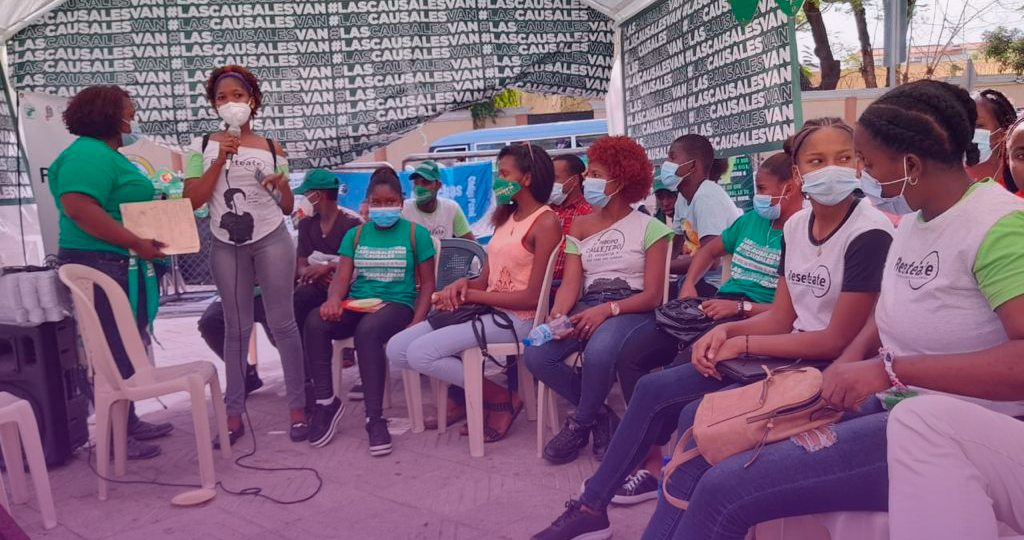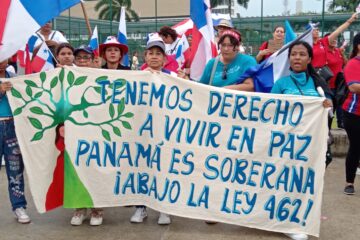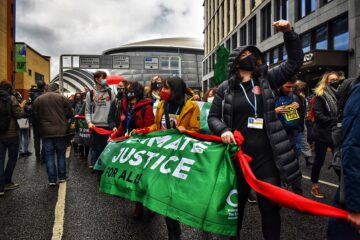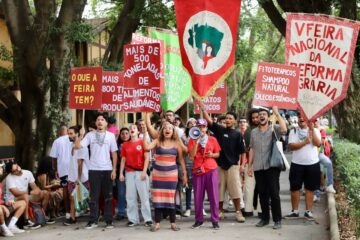At the National Confederation of Peasant Women (Confederación Nacional de Mujeres Campesinas—CONAMUCA), we work so that women can have land to live and produce. We are women who are capable of defending our rights, our bodies, our autonomy, and our territories. Through feminism, we face climate change and gender-based violence, and we struggle for sexual and reproductive rights, agroecology, and food sovereignty. We are a member of the World March of Women. We understand the March is a space for international joint efforts, which create spaces for women’s political participation in the struggles for equality and better living conditions for all.
In our everyday work, political education is a key pillar. The grassroots feminist education we provide is what allows us to strengthen bonds between women and communities, and it is what allows us to have different views on our society’s patriarchal conditioning. Our political education efforts aim to change normative ideas about the role of men and women in society.
A History of Grassroots Feminist Education
I joined the feminist struggle in 2011. I joined the National Confederation of Peasant Women (CONAMUCA) after attending a political education school. That was where I started to feel this agitation. I was the first and only women in my family to join a women’s movement that fights patriarchy.
The first module at the school was about self-esteem and personal growth. We also discussed sexual and reproductive rights, reflected about the impacts of patriarchy on women’s lives, discussed the systems of oppression and feminist struggles. The school modules changed our lives as women.
One of the tasks assigned to participants was to replicate that education effort in their communities. After the experience, a sister who had been organizing for longer suggested we created a women’s group in our community, in a rural area in the San Cristóbal province.
Our goal was to allow these women to also learn what we had learned and, like us, be able to see that they were not really aware of what was happening in society. We wanted to help them understand how we were taught to think so many things are normal—so that they could see, for example, how we, as women, have been abused for so long, and that this is not something natural.
After all this process of political education and multiplication, some women refused to join our organization claiming religious reasons, with a conservative rhetoric about being submissive to men. Other women understood, became aware, and joined it, like us. This is how we established the community’s Grassroots Women’s Association (Asociación de Mujeres de Base), a group that is part of CONAMUCA.
We have encouraged these women the same way we were encouraged in the organization’s political education school process, and then many of them took part in the school as well. These women have continued to engage in and be part of the organization, and they continue to be part of it to this day.
Organized Youth
In 2018, we joined the Youth Activisms for Gender Equality, a campaign that already existed in eight Latin American and Caribbean countries. The campaign aimed to dismantle the social imaginaries that strengthen violence against women—like the ideas that women are supposed to be in the household and men are meant to be out in the world, or that no one should meddle in an argument between husband and wife.
We established the youth group Youth Renovation for a World With No Prejudice (Renovación Juvenil Por Un Mundo Sin Prejuicio). We have decided to work not only with young women, but also with young men, because they were reinforcing these violent imaginaries. We mapped the community to learn how young people were living, their likes and dislikes, to be able to plan a way to integrate them. We noticed that young people in our community like music. And this is how we decided to create a vocal and a dance group to dismantle violent imaginaries.
Many young people still thought that men should be in charge. During our political education efforts, they would make comments about situations like a guy having a girlfriend, seeing her talking to another man, and thinking she was flirting. Based on what they were sharing, we started to write songs about these violent imaginaries that affect women.
Once we did that in our community, we realized we had to take our activities to other communities. We mapped that and held a sports event where each move had a meaning: “a home run against inequality,” “a hit for the end of violence,” etc.
We also organized educational championships. We handed out materials for participants to study beforehand, according to the subject, and we asked questions so they could display how much they knew about each topic. We also produced podcasts and created many other strategies to integrate young people.
We now have 11 youth groups across different communities. All this work has one goal: to continue to spread feminism, dismantling everything we have learned and putting an end to all these violent imaginaries that affect girls and boys in the communities. By learning more about political organizing and becoming closer to it, many young members of these groups created proposals and presented them to Congress, demanding actions to address issues like violence and child marriage.
We also have community girls’ clubs where we talk about child marriage and teenage pregnancy, and mothers’ clubs and friends of the community clubs, to address the issue of violence against children, women, and young people. We have safe listening groups in the communities, with young girls and women who are qualified to listen to victims who have not yet been able to break the cycle of violence. We support these victims as they reach out to authorities and community organizations, exercising the necessary discretion, to create ways to break free from violence.
With all these political education and organizing efforts, we, women and youth, are always ready for any mobilization—we are always struggling to fight this oppressive patriarchal system. And this is what matters most.

Daniela Javier is a member of the National Confederation of Peasant Women (Confederación Nacional de Mujeres Campesinas—CONAMUCA) and the World March of Women in the Dominican Republic.




